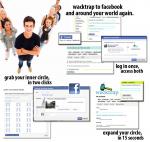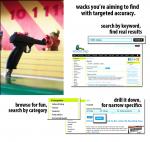What’s your story?
Share and find customer experiences
Connect with the people behind them
Wacktrap is
feedback made social
Trending Content
New Apartment and Home Rentals are a Lot Like a Relationship
by Shannon Miller

New apartment and home rentals are a lot like a relationship starts out, in the beginning. Everything is shiny and new and you see what you want to see, ignoring the cracks and broken handles, focusing instead on the fresh paint and new carpet. People often forget to take simple steps -- steps to help avoid being taken advantage of when renting a new apartment, condo or home, and to ensure you and your cash don’t part ways. Skipping those steps can mean a hard lesson down the road. Like in love, the devastation often includes money and heartbreak -- or both.
The reason for this wack is simple: time and time again, I’ve watched as friends and family have forgotten the simple tenets -- the doctrine or principle -- of being tenants. The result -- a mess that can be virtually impossible to clean up in the end. The devil truly is in the details: in life, and in court, if it isn’t in writing, it doesn’t exist -- at least not if you plan on getting your money back after move-out.
In the beginning, what you see is pretty and perfect – but the experience can, and most often does, turn into an ugly monster where money is concerned.
Even looking for a place to rent can be stressful -- so it’s no wonder that, once that move-in day arrives, ignoring any additional task is tempting. We’ve all been through the long and tedious apartment rental search, often performed in haste or by necessity at the last minute. It’s so exciting to find a new home in our budget and timeframe, and the leasing company or manager is all too happy to rent the apartment or property –all of which creates a perfect recipe for disaster. They are happy to meet us, and we are happy to meet them. As new renters we can tend to take things at face value, choosing to believe in the honesty or word of someone we’ve never met, and choosing to dumbly proceed without caution. We might see a small hole in the wall, a missing handle on a cupboard, damaged doorknob, broken lightbulb, or non-functioning hall light -- but we’re optimistic, and see those items as maybe minor imperfections in a scene eclipsed by fresh paint. We focus on imagining and mentally planning where everything will go, how we’ll organize, or how we’ll decorate. If a renter brings up imperfections or items to be fixed, the standard property management or landlord response is the warm reply of “no problem, we’ll take care of it.” But rather than follow up on those items for repair, on move-in day, we we choose to take the easier path -- ignoring the list until later, when we believe it will be much more convenient.
Rather than requiring a move-in day walkthrough, so that needed repairs can be correctly documented on the rental or lease agreement, we choose the much more exciting path of “I’LL TAKE IT!”
When move-in day arrives, the door opens to this new place that is now home. You get down to unloading, or watching the movers place boxes -- and ignoring the obvious task: to inspect every detail of the apartment, make notes of any needed repairs, and take photographs with date stamp whenever possible, and make sure the manager or landlord agrees to clearly notate the items on the lease or rental agreement. You may even hear your family member or friend’s warning, in the back of your mind, but instead you proceed. You’re exhausted by the move and, tired, maybe you jot down the things you can, and make a mental promise to yourself -- to take care of those things on the first business day.
Work and life happen -- and so the day comes and goes. If it wasn’t for the dishwasher still not working, you wouldn’t even remember to speak to the rental office or leasing agency. You wonder why it takes three weeks to simply get the dishwasher repaired – which hasn’t worked since move-in – or even the missing medicine cabinet shelf replaced. You continue to fight with the broken track of the closet door – and realize that, of course, you never had this notated or added to the lease agreement. In fact, you never even read the rental agreement – unaware that your signature indicated your agreement that everything in the apartment was satisfactory and in working order.
You stay awhile in your new rental, but life goes well -- and you’re ready to move on to greener pastures. You provide proper advance notice to the property management company or landlord and, in the meantime, make things sparkle like Mr. Clean. And so it goes that you say your goodbyes, happily move on, and look forward to your security deposit and those funds being returned.
In many states laws govern how long you must wait for return of a deposit, the duration of which can vary but always requiring timeliness. In California state, for example, the security deposit must be returned to the prior renter within thirty days of move-out – and if that deposit is not returned, the lessor can be faced with legal penalties. But you don’t know this either -- so you call and wait, and call and wait. What happened to the friendly property manager, who liked you so much? You can’t believe he won’t return your calls. Or, maybe he’s no longer with the company.
When your security deposit is finally returned, it’s short of so much money that you’re sure there must be an error. You are entitled to written details of any deductions taken by property management or the landlord, but instead you’ve simply received a check in the mail -- or a simple form, indicating a huge cleaning fee, charges for a broken closet door track, charges for a medicine cabinet shelf. You could swear you told the property management agent about the issues when you met him at move-in, and you swore the company made a note of it -- but did YOU? No Pictures, No Documentation, No Proof. If you had those things you may have a leg to stand on, and evidence to show the rental company the discrepancy or problems. The rental company may even have agreed with you, that you are owed more – and, had it not, you could have taken the company to court and won. But, again, you’ve got: No Pictures, No Documentation, No Proof. Unless you protect yourself, that equals no money.
How to Protect Yourself with the PDP:
Pictures
Documentation
Proof
1. Like any relationship most things are great in the beginning
2. Note any imperfections
3. Get it in Writing
4. Take pictures of every room on move-in and move out
5. Read your rental Lease Agreement
6. Can’t say it enough: get it in writing
7. Keep records, dates and notes in a spiral notebook
8. Keep any email and all cellular phone records
9. Don’t Take someone’s word for it: words change
10. Employees change, and it’s not for your better
11. For God’s sake, GET IT IN WRITING!
SPEED UP YOUR ONLINE GROWTH
How To Wack
Take the Tour
Click on any image to start










